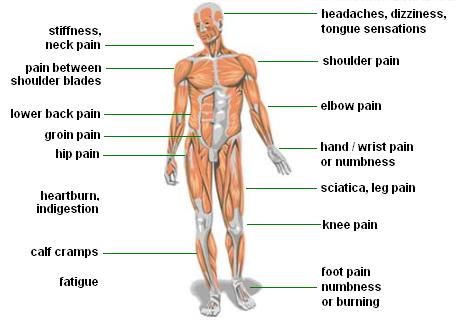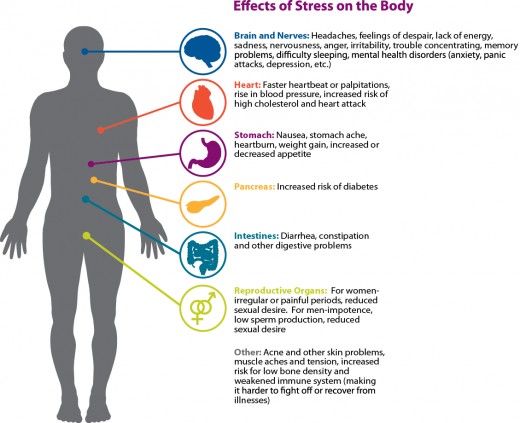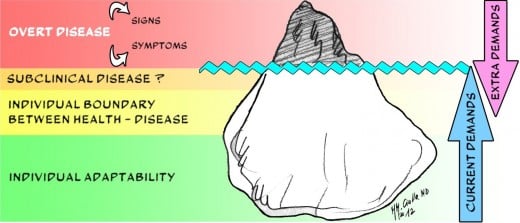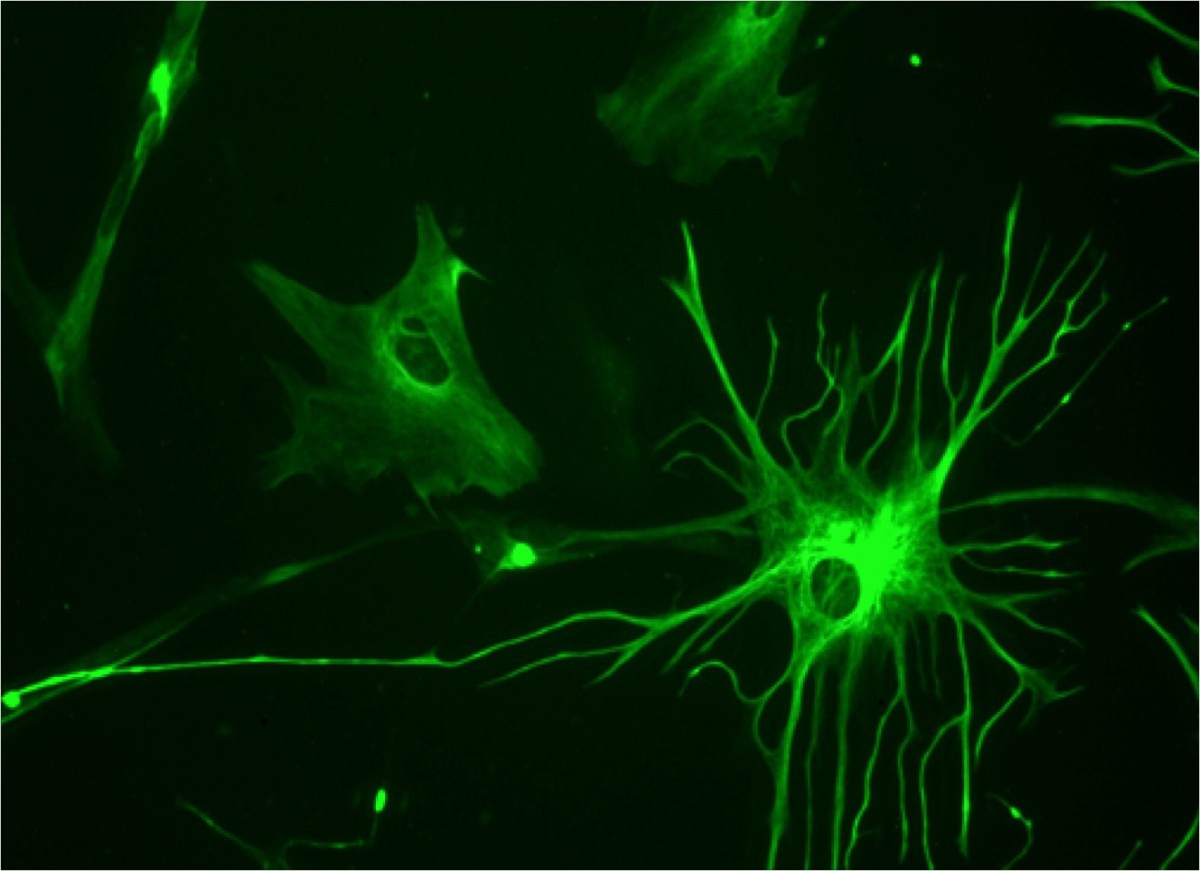The physical effects of psychological stress
Stress

The physical effects of psychological stress
How did physicians come to accept the fact that the mind plays a major role in both causing and healing disease ? It was simply a matter of hard facts.
The study of the role of stress in causing and healing disease came into its own with the work of Cannon and Selye, who carefully studied what happens to the various organs of the body in the presence of stress (which Selye defined clinically as "the nonspecific response of the body to any demand made upon it"). They uncovered a great deal of evidence that a change in organic function does indeed take place under stress. Selye also noted that emotional stimuli were the most common stressors.
A number of ailments have since then been identified (and the list gets longer every day) which have known stress-related origins. Depending on one's constitution, the nonspecific response to stress may affect almost any organ system in the body.
The following table lists the most common stress-related diseases, according to the organ system they attack:
Effects of stress

Psychological stress leads to undermentioned symptoms or diseases.
System
| Name of the symtoms or diseases
|
|---|---|
Digestive
| Anorexia Nervosa, Peptic ulcer, Ulcerative colitis, Irritable colon, Cardiopasm, Spastic colitis, Nervous vomiting & Diarrhoea.
|
Respiratory
| Asthamatic wheezing, Bronchial asthma.
|
Cardio-vascular
| Angina pectoris, Coronary insufficiency, Essential hypertension, Techycardia, Arrhythmias, Vascular headache.
|
Endocrine
| Hyperthyrodism, Diabetes mellitus, Menstrual irregularities
|
Skin
| Urticaria, Warts, Neurodermantitis, Pruritis, Psoriasis.
|
Connective
| Lupus Erythmetosus, Dermatomyositis, Scleroderma, Poluarteritis Nodosa
|
Effects of stress

Psychological stress
Not long ago the central nervous system was considered to be a rigid and unmodifiable director of the various paradoxical reactions of the bodily systems to the best tested therapeutic regimens. Now it has been learned that the central nervous system is also susceptible to psychosomatic damage.
An excellent explanation of this discovery was presented by A.M. Rabiner and M. Keschner in an article on the role of psychic factors in the production of organic nervous disease. They referred to the great number of patients who in the course of routine neurological examination presented no objective findings and were consequently diagnosed as a suffering from "non-organic" or "functional" diseases and were treated as such.
After reading some cases conclude :
- The evolution of some organic nervous disease may occur in two phases : (a) the early "non-organic" and (b) the later organic phase.
- The transition between these two phases may be imperceptible and only appreciated after prolonged observation by the same observer.
- During this transition there may occur structural change in the nervous system resulting from emotional disturbances during the first or "non-organic" stage.
- Evidence is adducted that not only is it the case that structure may influence function, but also that function may influence structure.
- An explanation is offered that psychical factors, acting upon the autonomic nervous system, affect lipoid metabolism and so produce structural change in the nervous system.
Psychological stress
Psychogenesis of epilepsy
Every medical practitioner knows that the epilepsy is due to local electrical discharges in the brain. It may be considered as an organic nervous disease, yet epilepsy is known to be very often psychically precipitated (F. Fremount, A. Ohiabov). Epilepsy may even be caused entirely be emotional tension. S. cobb has pointed out a psycho-physical mechanism in the production of epileptic attacks. "The emotional element in many cases is obvious at least as a precipitating factor. Many a patient will tell how his seizures are brought on by emotional stress have definite theoretical explanation in physiological mechanisms. Fight, anger and other emotions are known to cause pallor of the face and changes in blood circulation elsewhere in body. Emotion with its resulting vasoconstriction might cause a sudden and brief reduction of oxygen supply to the brain.
Anxiety invites infection
It was commonly thought that infectious diseases are only due to infective organisms. Contrary to this common belief a number of observations revealed that colonization of a host by infective organisms does not necessarily result in illness. It is body's own level of resistance, which varies with stress, which is the causative factor.
Anxiety and other stresses also influence the rate of recovery from such diseases as infectious mononucleosis (Greenfield, 1959) and influenza (Imoden, 1961) as well as the susceptibility to rhinovirus induced common cold (Totman, 1977) and tularemia (Canter, 1972). Recurrent herpes simplex lesions have been shown to be most frequent in persons who tend to feel depressed (Katcher, 1973; Luborsky 1976). Anger has been known moreover to alter the bacterial composition of the intestine (Holdeman, 1976).
From the physiological perspective , psychological stress increases the production of ACTH-releasing factor in the hypothalamus. Therefore, secretion of ACTH (adrenocorticotropic hormone) from the pituitary is raised. ACTH stimulates the adrenal cortex to increase the level of corticosteroids. The increased blood concentration of corticosteroids and other steroid hormones in turn depress the immunological defence mechanism, which increases the body's susceptibility to infective organisms. Experimentally, adverse mental reaction to separation (Coe, 1978), and clinical depression (Sachar, 1975) have been shown to increase the corticosteroid levels.
Anxiety invites infection

Psychological stress - slow poison
When one becomes emotionally disturbed, why is organic illness not seen immediately ? This is a very good question, because if organic illness followed every emotional disturbance, there would be no need for this book. Rather, the organic illness by itself would have taught us the great lesson of the need to retain emotional balance. In fact our body has a large amount of reserve capacity.
For example, our heart possesses four to six times more capacity than the minimum required. Thus only when the capacity of the heart is reduced four to six times below normal do we suffer heart failure.
Likewise, a good surgeon can remove twelve feet of small intestine out of twenty two feet of its normal length without harming digestion. In the same way, he can remove one kidney without reducing the normal performance.
Our bone marrow can increase the production of red blood cells almost seven fold whenever required. The fact is, then, every emotional disturbance does cause organic changes and reduces the attacked organ's reserve capacity.
But only when all of our organic reserve is depleted we do suffer from overt organic diseases (clinical cases). The process of depletion of reserve capacity may take many years before clinical cases are seen. In this way, psycholoogical stress acts as a slow poison.
The iceberg of disease
The floating tip of the iceberg represents what the physician sees, i.e. the clinical case. The submerged portion of the iceberg represents the hidden mass of disease. The slow poison of psychological disturbance gradually builds up this hidden mass and the disease ultimately becomes apparent.
Therefore one must not become alert only when clinical detection of a disease is made. One must put forth great efforts to preserve the reserve capacity of the body by leading an emotionally stable and healthy life.
The iceberg of disease

The long arm of psychological stress
Along with predisposing us to so many diseases stress reduces the lifespan of cells, memory and working efficiency.
In genetic engineering terms, stress increases the conjugation of RNA (Ribonucleic Acid) and DNA (Deoxyribonucleic Acid). It also increases the free radical of RNA in the cells. Both these effects together reduce the life span of cells. This change takes place in all the cells of the body. Thus chronic stress brings on premature old age.
The conjugation of RNA and DNA , and production of the free radical of RNA in the neurons is extremely hazardous because the neurons cannot be regenerated, once they are destroyed. This change normally due to stress, diminishes memory and intellectual power.
This effect was observed in students who are anxious and excited (or depressed) during examinations. Thus, stress has a very long arm and affects health in many ways.








